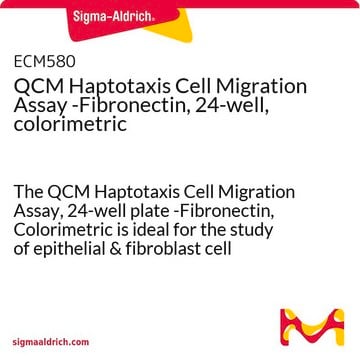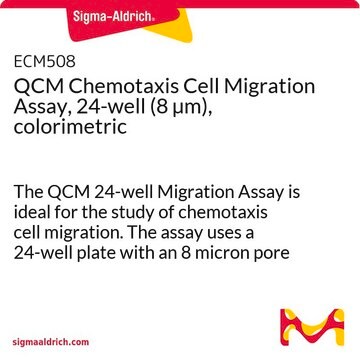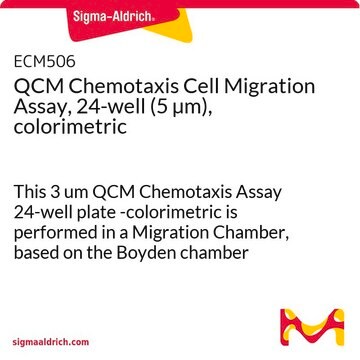ECM582
QCM Haptotaxis Cell Migration Assay -Collagen I, 24-well, colorimetric
The QCM Haptotaxis Cell Migration Assay, 24-well plate -Collagen 1, Colorimetric is ideal for the study of epithelial & fibroblast cell haptotaxis.
Iniciar sesiónpara Ver la Fijación de precios por contrato y de la organización
About This Item
UNSPSC Code:
12352207
eCl@ss:
32161000
NACRES:
NA.84
Productos recomendados
Quality Level
species reactivity
vertebrates
manufacturer/tradename
Chemicon®
QCM
technique(s)
cell based assay: suitable
detection method
colorimetric
shipped in
wet ice
General description
Also available: Cell Comb Scratch Assay! Get biochemical data from a scratch assay!Click Here
Introduction
The CHEMICON QCM Haptotaxis Cell Migration Assay - Collagen 1, Colorimetric is ideal for the study of epithelial and fibroblast cell haptotaxis. The quantitative nature of this assay is especially useful for large scale screening of pharmacologic agents. BSA-coated control chambers provide an appropriate migration control. The 8 μm pore size of this assay′s Boyden chambers is not appropriate for the study of lymphocyte migration.
• Each kit provides sufficient materials for the evaluation of 12 samples.
• Please refer to the product insert for assay details.
The CHEMICON QCM Haptotaxis Cell Migration Assay - Collagen 1, Colorimetric assay is intended for research use only; not for diagnostic applications.
Introduction
The CHEMICON QCM Haptotaxis Cell Migration Assay - Collagen 1, Colorimetric is ideal for the study of epithelial and fibroblast cell haptotaxis. The quantitative nature of this assay is especially useful for large scale screening of pharmacologic agents. BSA-coated control chambers provide an appropriate migration control. The 8 μm pore size of this assay′s Boyden chambers is not appropriate for the study of lymphocyte migration.
• Each kit provides sufficient materials for the evaluation of 12 samples.
• Please refer to the product insert for assay details.
The CHEMICON QCM Haptotaxis Cell Migration Assay - Collagen 1, Colorimetric assay is intended for research use only; not for diagnostic applications.
Application
Research Category
Cell Structure
Cell Structure
Packaging
Sufficient for analysis of 12 samples
Components
Collagen 1 Test Plate: (Part No. 2005690) One 24-well culture plate, containing 12 human Collagen 1 coated Boyden chambers, sufficient for the evaluation of 12 test samples.
BSA Control Plate: (Part No. 2005791) One 24-well culture plate, containing 12 BSA-coated Boyden chambers, sufficient for the evaluation of 12 controls.
Cell Stain Solution*: (Part No. 20294) One vial - 10 mL.
Extraction Buffer: (Part No. 20295) One vial - 10 mL.
24 well Stain Extraction Plate: (Part No. 2005871). One plate.
96 well Stain Quantitation Plate: (Part No. 2005870). One plate.
Swabs: (Part No. 10202) 50 each.
Forceps: (Part No. 10203) 1 pair
*Cell Stain Solution contains a small amount of crystal violet, which is toxic if swallowed or inhaled, and may cause irritation to the eyes, respiratory system, and skin. Handle with caution.
BSA Control Plate: (Part No. 2005791) One 24-well culture plate, containing 12 BSA-coated Boyden chambers, sufficient for the evaluation of 12 controls.
Cell Stain Solution*: (Part No. 20294) One vial - 10 mL.
Extraction Buffer: (Part No. 20295) One vial - 10 mL.
24 well Stain Extraction Plate: (Part No. 2005871). One plate.
96 well Stain Quantitation Plate: (Part No. 2005870). One plate.
Swabs: (Part No. 10202) 50 each.
Forceps: (Part No. 10203) 1 pair
*Cell Stain Solution contains a small amount of crystal violet, which is toxic if swallowed or inhaled, and may cause irritation to the eyes, respiratory system, and skin. Handle with caution.
Linkage
Replaces: ECM502
Storage and Stability
Store at 4°C for up to one year after date of purchase.
Legal Information
Accutase is a registered trademark of Innovative Cell Technologies, Inc.
CHEMICON is a registered trademark of Merck KGaA, Darmstadt, Germany
Disclaimer
Unless otherwise stated in our catalog or other company documentation accompanying the product(s), our products are intended for research use only and are not to be used for any other purpose, which includes but is not limited to, unauthorized commercial uses, in vitro diagnostic uses, ex vivo or in vivo therapeutic uses or any type of consumption or application to humans or animals.
signalword
Danger
hcodes
Hazard Classifications
Eye Irrit. 2 - Flam. Liq. 2
Storage Class
3 - Flammable liquids
wgk_germany
WGK 3
Certificados de análisis (COA)
Busque Certificados de análisis (COA) introduciendo el número de lote del producto. Los números de lote se encuentran en la etiqueta del producto después de las palabras «Lot» o «Batch»
¿Ya tiene este producto?
Encuentre la documentación para los productos que ha comprado recientemente en la Biblioteca de documentos.
Mariel Maldonado et al.
American journal of respiratory cell and molecular biology, 59(1), 77-86 (2018-01-27)
Idiopathic pulmonary fibrosis (IPF) is a chronic and progressive aging-associated disease of unknown etiology. A growing body of evidence indicates that aberrant activated alveolar epithelial cells induce the expansion and activation of the fibroblast population, leading to the destruction of
Nilgun Tasdemir et al.
Scientific reports, 10(1), 11487-11487 (2020-07-15)
Invasive lobular carcinoma (ILC) is a histological subtype of breast cancer with distinct molecular and clinical features from the more common subtype invasive ductal carcinoma (IDC). ILC cells exhibit anchorage-independent growth in ultra-low attachment (ULA) suspension cultures, which is largely
Nuestro equipo de científicos tiene experiencia en todas las áreas de investigación: Ciencias de la vida, Ciencia de los materiales, Síntesis química, Cromatografía, Analítica y muchas otras.
Póngase en contacto con el Servicio técnico










